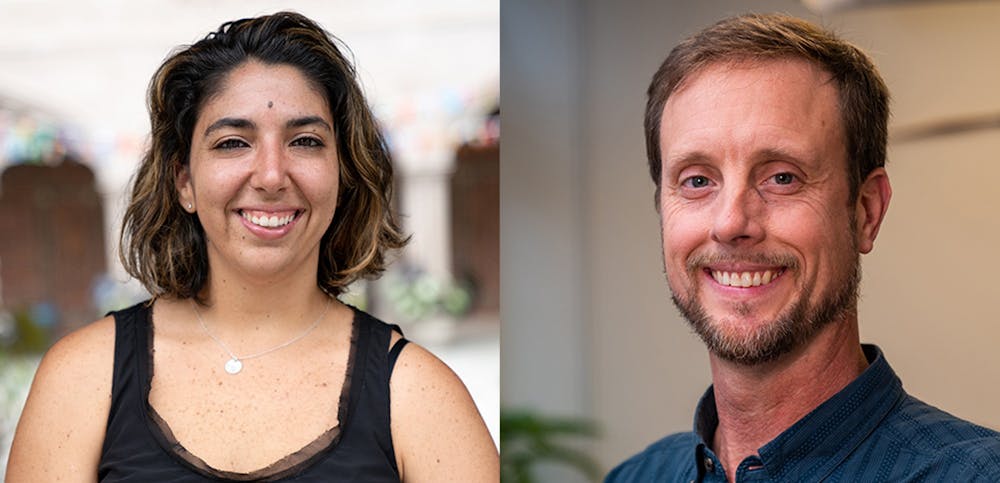Two University of Richmond geography professors have had to adjust their three-year project studying environmental changes in the Amazon to a virtual format amid the COVID-19 pandemic. The project is funded by a $700,000 NASA grant and is currently in its second year.
Stephanie Spera, professor of geography, and David Salisbury, chair of the geography department, are co-principal investigators for the project, Salisbury said.
Spera and Salisbury planned to use the money from the NASA grant to research how changes in land use have affected the Amazon, according to a UR press release from December 2019, when the grant was first awarded. They also planned to create analytical and educational tools for local policymakers in the Amazon, according to the release.
Salisbury said that the Amazon's land had been under siege from lots of threats, ranging from illegal logging and mining to drug trafficking, that pose risks to the indigenous cultures of the region as well as the flora and fauna.
"We have just about finished our first year of the grant -- under less than ideal circumstances with the pandemic," Salisbury said. "It's been a change, but what we're doing, we're making progress, and I think we have a plan to continue working hard so that we can produce the best outcomes possible."
The goals of the project are to understand how forest degradation, deforestation and road building affect a healthy ecosystem and the water cycle in the southwestern Amazon and to develop tools to improve the sustainable use of resources by oil companies, miners, road engineers and loggers who impose on locals in the region, according to Spera’s website.
Working alongside Spera and Salisbury is a team of 11 undergraduate students and one post-doctoral researcher, Yunuen Reygadas, who graduated from Texas State University in fall 2019 and joined the team this past summer, Reygadas said.
Reygadas said she had faced some challenges in the role, such as learning a new software language, but emphasized that she was happy and excited to be working on the project.
"I am testing and implementing different algorithms that can detect forest degradation and deforestation through time," Reygadas said. "We are also working with student researchers, some of whom are using satellite images to validate our algorithms."
Salisbury said he was grateful for Reygadas and Spera's work on the project.
“It's great to be working here with a scientist of Dr. Spera’s caliber, as well as with Dr. Reygadas," Salisbury said. "We're really excited to see the outcome of the next few years and if we're able to really make some connections between deforestation and degradation and ecosystem services, with a particular eye towards the water cycle and climate.”
Although the team has not been able to visit the Amazon during the pandemic, they have continued their work by communicating virtually with those they are connected to in the region, including local governments and indigenous groups, Salisbury said.
Enjoy what you're reading?
Signup for our newsletter
Salisbury also emphasized the role that students have played in the project.
“We have an amazing team of undergraduates working on the project,” he said.
Students are working for the project in a variety of capacities, including collecting training-data from satellites, mapping the political ecology of new logging roads and building apps that will allow stakeholders to understand deforestation in real-time, according to Spera's website.
Senior Virginia Sun started working on the project this semester, Sun said. She helps analyze Spanish- and Portuguese-language news media, legislation and policy debates surrounding the proposed construction of two major roads that interrupt the Amazon region, she said.
Sun said her team focused on projecting the socio-environmental impacts of proposed road construction and connecting local indigenous and environmental groups with their information.
"As someone who is passionate about international development in Latin America," Sun said, "I will incorporate what I learn from my team about contextualizing the varied meanings of infrastructure projects, collaborating with local civil society and indigenous group and using maps as powerful rhetorical tools into my future career.”
The NASA grant is almost halfway through its original three-year timeline, but Salisbury said all grant-making organizations had been adjusting to the new reality of COVID-19 and the NASA grant timeframe could be extended if needed.
Reygadas said working remotely and not be able to travel to the Amazon and collect information had been challenging. She noted that satellite images had been crucial to collecting information remotely.
Spera is currently on maternity leave, but she will continue working on the grant in the spring as well as will teach physical geography courses that will potentially prepare some students to make more contributions on the project, Salisbury said.
"We're excited for the spring, and we're hopeful to get more students involved in and continuing to work on this project," Salisbury said.
Contact public relations director Heather Neiman at heather.neiman@richmond.edu.
Support independent student media
You can make a tax-deductible donation by clicking the button below, which takes you to our secure PayPal account. The page is set up to receive contributions in whatever amount you designate. We look forward to using the money we raise to further our mission of providing honest and accurate information to students, faculty, staff, alumni and others in the general public.
Donate Now



